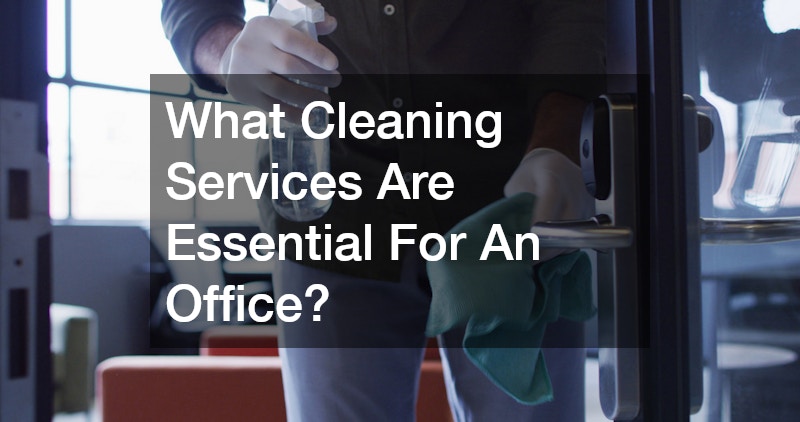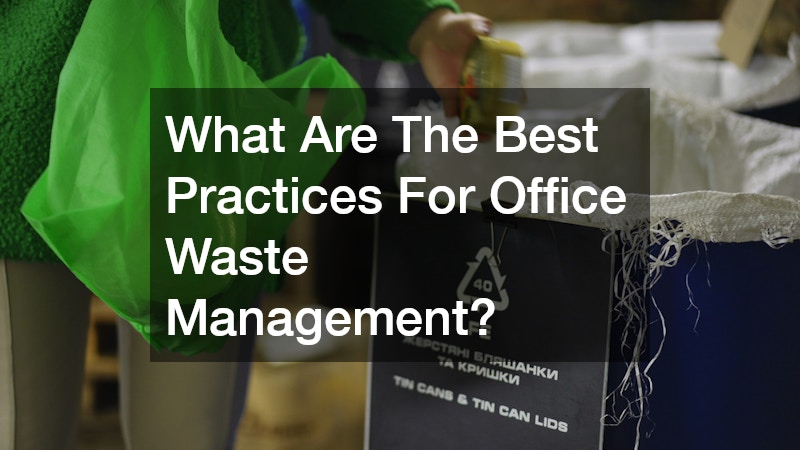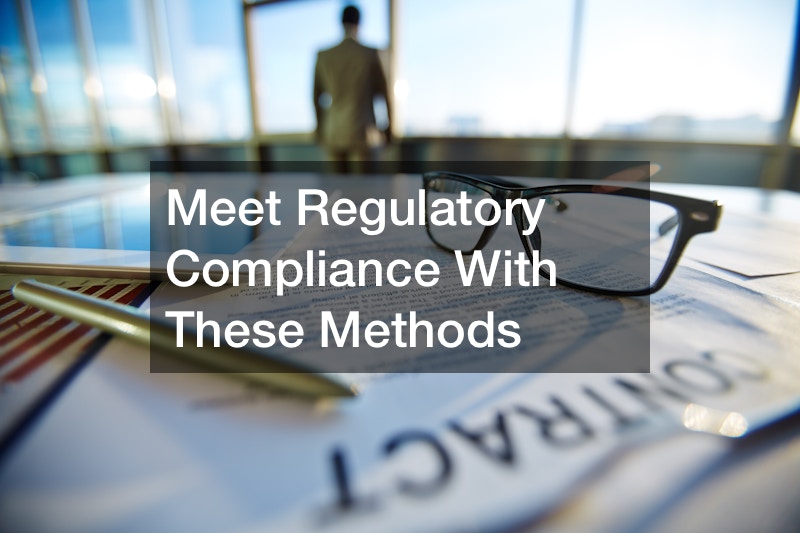Keeping Your Commercial Space Running Smoothly Must-Have Services for Every Office


In today’s fast-paced business environment, the smooth operation of a commercial space goes far beyond providing desks and chairs. The efficiency, safety, and overall functionality of an office rely on a range of essential services that support both employees and business operations. From cleaning services to preventive maintenance, ensuring your office is properly managed can save costs, enhance productivity, and create a welcoming environment for both staff and clients.
This article explores the must-have services for every office, emphasizing how professional support in areas like facility maintenance, cleaning, and equipment management can help maintain a productive workspace.
What Cleaning Services Are Essential For An Office?

Daily Cleaning Routines
Regular cleaning is critical to the functionality of any office. Daily cleaning routines involve maintaining the overall cleanliness of high-traffic areas such as lobbies, restrooms, break rooms, and workstations. For offices with complex flooring, hiring an industrial epoxy flooring service can help protect surfaces while ensuring hygiene standards are maintained. Alongside routine cleaning, offices may also benefit from specialized services such as commercial carpet cleaning company services, which help preserve expensive carpeting and maintain a professional appearance.
Deep Cleaning Services
Beyond daily upkeep, deep cleaning services are essential to target areas often overlooked during routine maintenance. These services include high-level dusting, sanitation of HVAC vents, detailed floor scrubbing, and extensive restroom cleaning. Partnering with a commercial carpet cleaning company services provider ensures that carpets and upholstery remain free from deep-seated dirt and allergens. Additionally, incorporating cleaning equipment designed for heavy-duty tasks can make deep cleaning both efficient and thorough.
Green Cleaning Solutions
Sustainability in office maintenance is becoming increasingly important. Green cleaning solutions involve using eco-friendly products and practices that reduce chemical exposure and environmental impact. Local HVAC companies may advise on maintaining indoor air quality alongside green cleaning, ensuring that offices remain healthy for employees. Combining these strategies with responsible waste disposal practices enhances both the environmental profile and the health standards of a commercial space.
Specialized Cleaning For Specific Industries
Certain industries, such as healthcare or food services, have unique cleaning requirements. Specialized cleaning services cater to these needs by implementing protocols tailored to compliance standards, hygiene, and safety. These services may include sanitization of medical equipment, targeted cleaning for lab spaces, or adherence to food safety regulations. Engaging professional cleaning providers guarantees that offices meet regulatory standards while maintaining a safe working environment.
Cost Of Office Cleaning Services
Investing in professional cleaning services can initially seem costly, but the long-term benefits far outweigh the expense. Effective cleaning not only prolongs the life of office infrastructure, including commercial roofing and flooring, but also reduces employee sick days and boosts productivity. Whether it’s daily maintenance or periodic deep cleaning, partnering with reliable providers ensures that costs remain predictable and operations uninterrupted.
How Can I Ensure Reliable IT Support?
On-Site Vs. Remote IT Support
Reliable IT support is critical for office functionality. On-site support allows technicians to address hardware issues and network problems directly, while remote IT support can quickly resolve software or connectivity issues. Combining both approaches ensures minimal downtime and allows employees to maintain productivity, even during unexpected technical problems.
Network Security Services
Protecting sensitive company data is a top priority for any business. Network security services include firewalls, intrusion detection systems, and regular vulnerability assessments. Integrating cybersecurity measures within office operations, alongside traditional security systems, helps prevent unauthorized access and data breaches.
Regular Software Updates And Management
Regular software updates ensure that all office systems operate efficiently and securely. This includes updating operating systems, antivirus programs, and industry-specific applications. IT service providers can automate updates and maintain software licenses, ensuring compliance and operational continuity.
Data Backup And Recovery Plans
Unexpected system failures can have significant consequences for a business. Implementing data backup and recovery plans guarantees that important information is preserved and can be restored quickly. Whether through cloud storage or on-site servers, a comprehensive plan reduces the risk of data loss and maintains business continuity.
Benefits Of Outsourcing IT Support
Outsourcing IT support allows businesses to access specialized expertise without the burden of hiring a full-time team. It provides cost efficiency, timely problem resolution, and access to the latest technological solutions. Combined with other essential office services, outsourced IT support ensures that a workspace remains both functional and secure.
What Are The Benefits Of Regular Maintenance Services?

HVAC System Maintenance
Maintaining HVAC systems is vital for employee comfort and energy efficiency. Local HVAC companies can provide scheduled inspections, filter replacements, and system upgrades to ensure optimal performance. Proper HVAC maintenance not only improves indoor air quality but also reduces the likelihood of costly breakdowns during peak office hours.
Electrical System Checks
Regular electrical system checks prevent unexpected outages and potential hazards. These inspections include testing circuit breakers, evaluating wiring integrity, and ensuring compliance with safety regulations. A proactive approach to electrical maintenance protects both employees and office assets.
Plumbing Maintenance
Well-maintained plumbing ensures consistent water flow, reduces leaks, and prevents costly damage. Services such as well pump serviceshttps://www.capitalcitywelldrilling.com can be critical for offices in buildings that rely on independent water sources. Routine plumbing checks also help maintain restroom facilities and kitchen areas, which are essential for a productive work environment.
Elevator And Escalator Inspections
Commercial elevator repair is an essential service for multi-story office buildings. Regular inspections ensure safety, prevent downtime, and comply with regulatory standards. Escalators and lifts must be serviced by certified professionals to avoid accidents and maintain smooth vertical transportation within the office.
Preventative Maintenance Scheduling
Implementing a preventative maintenance schedule allows businesses to address potential issues before they escalate. This strategy applies to HVAC systems, electrical networks, plumbing, elevators, and other critical infrastructure. Scheduled maintenance extends equipment life, reduces emergency repair costs, and ensures continuous office operations.
Why Is Security Important For A Commercial Space?
Access Control Systems
Modern access control systems manage employee and visitor entry to office spaces. These systems enhance safety by restricting unauthorized access and can be integrated with surveillance technologies to monitor activity in real-time. By combining access control with other security measures, businesses can protect both people and assets effectively.
Surveillance Camera Systems
Surveillance cameras are a visible deterrent against theft and misconduct. They also provide critical documentation in case of incidents. For larger office complexes, integrating surveillance systems with alarm monitoring ensures comprehensive protection across all facilities.
Alarm Systems For Offices
Alarm systems provide immediate alerts in case of intrusion, fire, or environmental hazards. Coupled with emergency response protocols, these systems ensure that office occupants can react quickly to potential threats, minimizing damage and maintaining business continuity.
Cybersecurity Measures
Cybersecurity is a critical component of modern office security. Firewalls, secure networks, and employee training programs reduce the risk of cyber threats. Combining digital security with physical safeguards creates a holistic approach to protecting both sensitive information and personnel.
Hiring Security Personnel
While technology enhances office security, trained personnel remain essential. Security staff monitor entrances, patrol facilities, and respond to emergencies. Hiring experienced personnel complements electronic systems and strengthens overall safety measures.
How Can I Improve Office Communication?
Implementing Unified Communication Tools
Unified communication tools integrate voice, video, and messaging platforms into a single system. This streamlines internal communication, reduces response times, and improves overall workflow efficiency.
Setting Up Video Conferencing Systems
Video conferencing has become an essential tool for modern offices. Reliable systems facilitate remote meetings, client interactions, and internal collaboration. Ensuring high-quality audio and video capabilities helps maintain professional standards and productivity.
Use Of Instant Messaging Platforms
Instant messaging platforms allow for quick and efficient communication between employees. They complement email systems and reduce the need for unnecessary meetings. Integrating messaging with unified communication tools ensures seamless connectivity across departments.
Creating Collaborative Workspaces
Designing spaces that encourage collaboration improves teamwork and innovation. Open layouts, flexible meeting areas, and comfortable communal zones support effective communication and foster a productive work environment.
Offering Communication Training
Providing training on effective communication practices enhances collaboration and reduces misunderstandings. Workshops, seminars, and online resources empower employees to use communication tools efficiently and professionally.
What Is The Role Of A Facility Manager?

Daily Operational Management
Facility managers oversee day-to-day office operations, including maintenance scheduling, supply management, and coordination with service providers. Their role ensures that the office runs smoothly and that employees can focus on core tasks.
Budget And Cost Management
Managing operational budgets is a key responsibility of facility managers. They allocate resources for cleaning services, commercial roofing maintenance, and other essential infrastructure projects while optimizing costs.
Compliance And Safety Standards
Facility managers ensure compliance with safety regulations, building codes, and industry standards. Regular inspections of storm drain services, elevators, and HVAC systems prevent legal issues and protect employees.
Vendor Management
Coordinating with local construction contractors, commercial carpet cleaning companies, and other service providers is crucial. Effective vendor management ensures that projects are completed on time, within budget, and to the required standards.
Space Planning And Utilization
Efficient space planning maximizes office functionality. Facility managers analyze space usage, implement flexible work areas, and ensure that infrastructure supports business operations effectively.
How Important Are Office Interior Design Services?
Design For Functionality
Functional design improves workflow and employee productivity. Proper layout, accessible storage, and ergonomic considerations help offices operate efficiently while maintaining aesthetic appeal.
Ergonomics In Office Design
Incorporating ergonomic principles in office furniture and workstation setups reduces strain and enhances employee comfort. Ergonomic chairs, adjustable desks, and monitor placement are essential for long-term employee wellbeing.
Incorporating Brand Identity
Office design should reflect the company’s brand and values. Consistent branding in color schemes, signage, and decor reinforces corporate identity and creates a cohesive professional environment.
Sustainability In Office Design
Sustainable design incorporates energy-efficient appliances, eco-friendly materials, and responsible resource use. Partnering with local HVAC companies for energy-efficient solutions and integrating renewable energy options promotes a greener workplace.
Creating Flexible Workspaces
Flexible workspaces adapt to changing business needs. Movable partitions, multipurpose rooms, and collaborative zones allow offices to accommodate team growth and project requirements without costly renovations.
What Are The Best Practices For Office Waste Management?

Recycling And Composting Programs
Recycling and composting initiatives reduce waste and promote environmental responsibility. Proper waste sorting and employee education ensure these programs operate effectively.
Hazardous Waste Management
Offices handling chemicals or electronics require specialized hazardous waste management. Partnering with certified waste disposal services protects employees and ensures regulatory compliance.
Paperless Office Initiatives
Transitioning to a paperless office reduces clutter and promotes efficiency. Digital document management systems streamline workflows and reduce the environmental footprint of daily operations.
Partnering With Waste Management Services
Professional waste management services provide reliable collection, recycling, and disposal solutions. Collaborating with these providers ensures that offices maintain cleanliness and meet environmental standards.
Educating Employees On Responsible Waste Disposal
Employee education is crucial for effective waste management. Training staff on recycling, hazardous waste handling, and resource conservation fosters a culture of responsibility and sustainability.
How Can I Ensure Employee Wellbeing In The Office?
Wellness Programs
Wellness programs promote physical and mental health through initiatives such as fitness memberships, mindfulness workshops, and health screenings. Supporting employee wellbeing increases productivity and reduces absenteeism.
Flexible Work Hours
Offering flexible schedules helps employees balance work and personal responsibilities. This flexibility contributes to job satisfaction, reduces stress, and improves overall workplace morale.
Catering To Dietary Preferences And Needs
Providing food options that cater to diverse dietary needs supports employee health. Offering healthy snacks, accommodating allergies, and maintaining clean dining areas are essential considerations.
Offering Mental Health Resources
Mental health resources, including counseling services and stress management programs, enhance employee wellbeing. Encouraging open communication about mental health helps create a supportive office environment.
Facilitating Physical Activity Opportunities
Integrating physical activity into the workday promotes overall health. On-site gyms, walking paths, and ergonomic office setups encourage employees to stay active, which can improve focus and reduce fatigue.
What Are The Energy Management Strategies For Offices?
Investing In Energy-Efficient Appliances
Energy-efficient appliances reduce operational costs and environmental impact. Installing efficient lighting, heating, and cooling systems helps offices achieve sustainability goals.
Implementing Smart Lighting Solutions
Smart lighting solutions allow for automated control of lighting levels based on occupancy and natural light. These systems optimize energy use and enhance the office environment.
Utilizing Renewable Energy Sources
Renewable energy sources, such as solar panels or wind power, contribute to sustainability initiatives and reduce reliance on traditional energy. Partnering with local construction contractors can ensure proper installation and integration.
Conducting Energy Audits
Regular energy audits identify inefficiencies and opportunities for improvement. Audits can highlight areas for improvement in HVAC systems, lighting, and equipment usage, driving both cost savings and environmental benefits.
Employee Energy Use Education
Educating employees about responsible energy use promotes sustainable practices. Encouraging behavior such as turning off unused equipment, managing heating and cooling, and reducing waste supports organizational energy goals.
A well-maintained office space extends beyond appearance, influencing productivity, safety, and sustainability. By investing in essential services such as commercial carpet cleaning company services, commercial elevator repair, storm drain services, well pump services, and industrial epoxy flooring service, businesses ensure smooth operations. Partnering with local HVAC companies, local construction contractors, and providers of commercial roofing or gutter cleaning services strengthens office infrastructure while supporting employee wellbeing.
Optimizing communication, maintaining security, and implementing strategic energy and waste management practices complete the framework for a successful office. By prioritizing these services, businesses can create a functional, safe, and inviting workplace that supports growth and long-term success.


